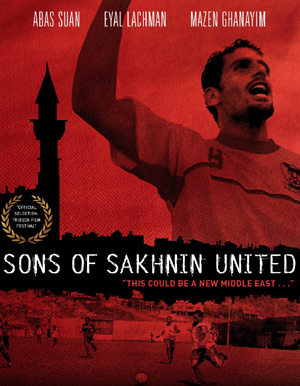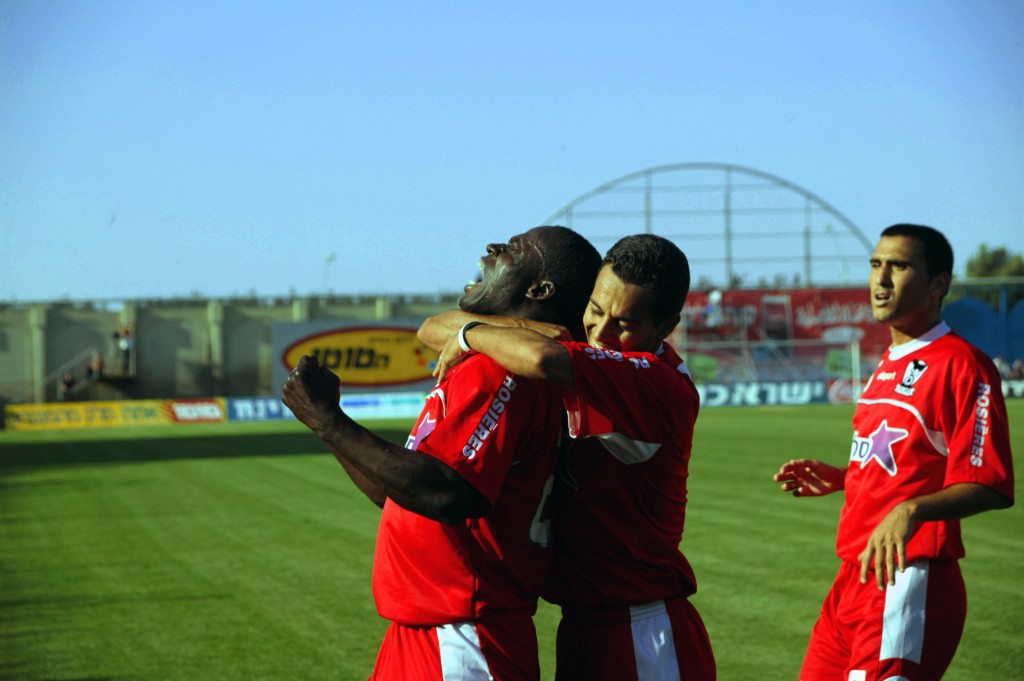Fri 21 May 2010
Cup Dreams
Posted by Ethan under Film Review, NYC Film Critic
Comments Off on Cup Dreams
After the Cup: Sons of Sakhnin United
Directed by Christopher Browne
***
One of the television highlights of the past year has been ESPN’s ambitious series 30 for 30, 30 documentaries covering 30 significant events in the past 30 years of sports history. The great thing about the series is that it doesn’t demand any familiarity with, or even a great affinity for, professional and/or collegiate athletics. Instead, almost every installment uses its specific subject as a jumping off point to explore larger, distinctly non-sports related issues.
A documentary about Muhammad Ali’s infamous bout with Larry Holmes, for instance, is less about the fight itself than the impact it had on the fighters’ respective legacies, while also providing a potent look into how one man’s attempts to recapture his past blinds him to the realities of the present. In another film, the 1993 trial of then-high school basketball star Allen Iverson becomes a means for the director to examine the legacy of racism in the Virginia hometown he shares with his subject. What the makers of 30 for 30 understand is that larger societal issues often play out in microcosm on the court/pitch/diamond or wherever else a sporting event is held. The history of sports, in essence, provides a window into the history of our ever-evolving culture.
If there’s one complaint I have about the series though, it’s that it has so far been almost entirely U.S.-centric. Aside from a lone hour devoted to the story of Nelson Mandela and the South African rugby team the Springboks (subject matter that was dramatized to lesser effect in Clint Eastwood’s recent Invictus) all of the documentaries focus on domestic sports history. That’s understandable since the films are being underwritten by an American cable network and pitched to an American audience. Still, there’s a whole wide world of sports out there (pardon the pun) that offer terrific stories just waiting to be told. Take, for example, the events chronicled in Christopher Browne’s new documentary, After the Cup: Sons of Sakhnin United. In 2004, the upstart Sakhnin United football club (and by football I of course mean the sport that’s known stateside as soccer) shocked the Israeli sports world by winning the country’s all-important State Cup in only their second year as members of the Premier League. What distinguished the Sakhnin club from its competition was that it consisted of both Jewish and Arab players, a rare occurrence for a top division team. Thus, Sahknin’s 2004 triumph was not only celebrated as a classic underdog victory, but also as a symbol for bridging the gap between Israel’s fractious Arab and Jewish population.
The tale of Sahknin’s road to victory is fodder for a great movie in and of itself, but Browne makes the intriguing choice of picking up the narrative the following year, when the glory of their triumph has faded and they have to prove their mettle all over again. Certainly, the team’s 2005 season was no Cinderella story; the losses piled up early on, threatening their ability to remain in the Premier League, and the increasingly tense relationship between head coach Eyal Lachman and some of his players eventually led Lachman to resign before the final six games. Meanwhile, Sahknin’s captain Abbas Suan—the team’s most prominent Arab player—was called up to join Israel’s national football club and scored a pivotal goal in a World Cup qualifying match, instantly making him a major celebrity. But hometown fans turned against him as the team continued to lose and he was criticized for his own mediocre play. Obviously every sports team has a losing season now and then, but because of their status as Israel’s premiere Jewish/Arab club, the Sahknin players feel an extra burden with each defeat. They aren’t simply letting down themselves and their fans…it’s almost as though they’re letting down their country’s hopes for peace.
With After the Cup, Browne has effectively distilled the events of Sahknin’s 2005 season into a lively and entertaining 80-minute feature. He clearly outlines what’s at stake if the club finishes with a losing record and gives viewers plenty of face time with some of the dominant personalities, including Lachman and Suan. The latter in particular is a real find—he’s as charismatic as any top-ranked American athlete, but also far more level-headed than an A-Rod or a Kobe. What the film doesn’t do quite as successfully is provide viewers with some context as to other major events happening in Israel at the time. The tension between the Arabs and Jews is obviously an important and ongoing issue, but 2005 was also the year that the government carried out its stated policy to evict Israelis from the Gaza Strip and areas in the West Bank, an important incident that merits at least a mention here. Browne also doesn’t follow through on story threads that are worthy of further exploration, such as Lachman’s adversarial relationship with the team’s foreign players (indeed, more time should have been spent with the men who were imported from abroad to play for Sahknin—what must their experience be like?) and Suan’s experiences playing for the national team. Overall though, After the Cup mostly accomplishes what a good sports documentary should, capturing the thrill of the game, while also indicating why it resonates beyond the stadium walls.
After the Cup: Sons of Sahknin United opens in New York today. Visit the official website to read about future release dates.




No Responses to “ Cup Dreams ”
Sorry, comments for this entry are closed at this time.